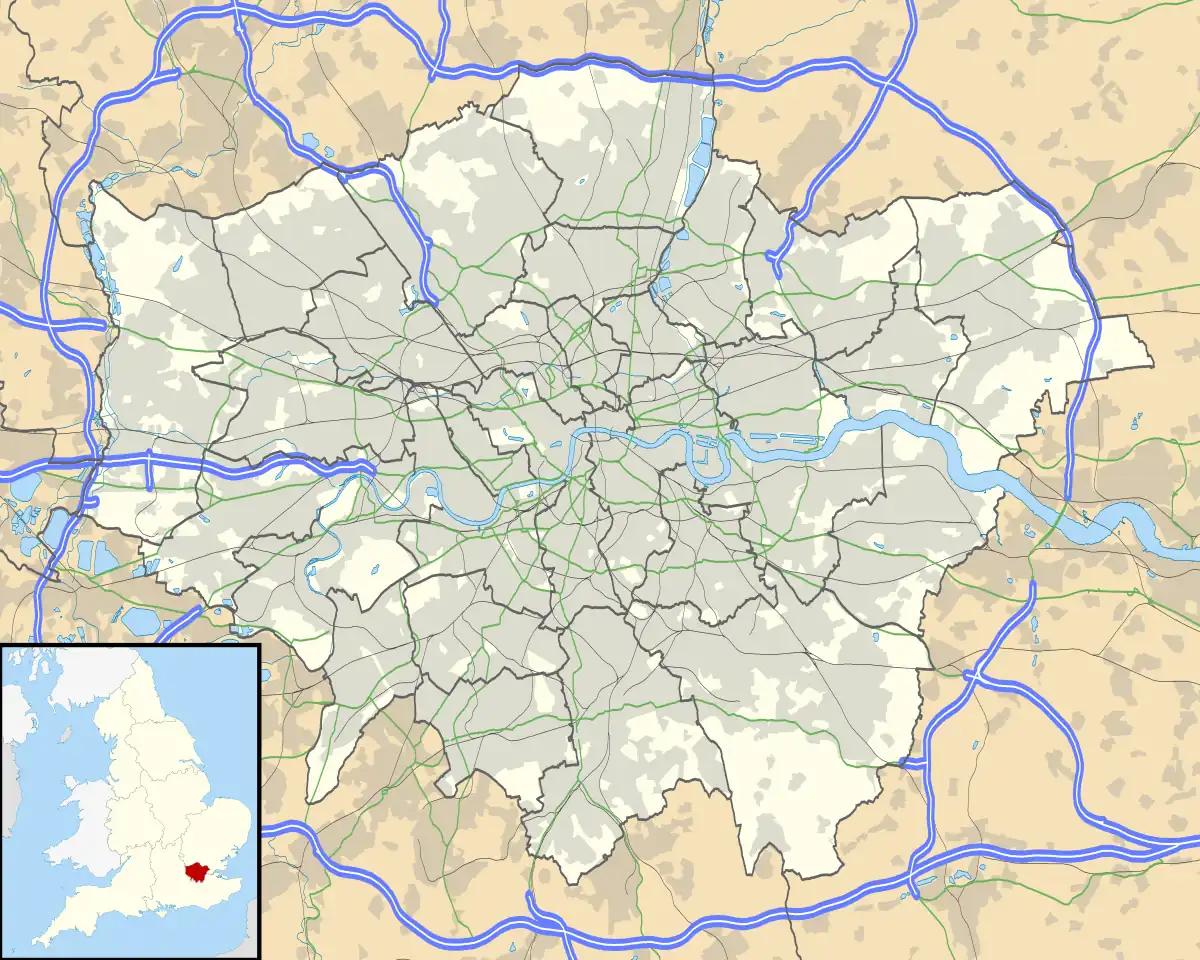Alexandra Palace television station
The Alexandra Palace television station in North London (grid reference TQ297901) is the oldest television transmission site in the world. What was at the time called "high definition", (405-line) the world's first TV broadcasts on VHF were beamed from this mast from 1936 until the outbreak of World War II. It then lay dormant until it was used very successfully to foil the German Y-Gerät radio navigation system during the last stages of the Battle of Britain. After the war, it was reused for television until 1956, when it was superseded by the opening of the BBC's new main transmitting station for the London area at Crystal Palace. In 1982 Alexandra Palace became an active transmitting station again, with the opening of a relay transmitter to provide UHF television service to parts of North London poorly covered from Crystal Palace.
 The transmission mast above the BBC wing of Alexandra Palace, photographed in 2001. | |
 Alexandra Palace Crystal Palace | |
| Tower height | 65.5 metres (215 ft) |
|---|---|
| Coordinates | 51°35′40″N 0°07′45″W |
| Grid reference | TQ297901 |
| Built | 1936 |
| Relay of | Crystal Palace |
| BBC region | BBC London |
| ITV region | ITV London |
| Local TV service | London Live |

The transmitter is owned and maintained by Arqiva.
Channels listed by frequency
Analogue radio (FM)
| Frequency | kW | Service |
|---|---|---|
| 103.3 MHz | 0.05 | London Greek Radio |
| 107.1 MHz | 0.1 | Capital Xtra |
Digital radio (DAB)
| Frequency | Block | kW[1] | Operator |
|---|---|---|---|
| 218.640 MHz | 11B | 0.2 | DRG London |
| 222.064 MHz | 11D | 2 | Digital One |
| 223.936 MHz | 12A | 0.1 | Switch London |
| 225.648 MHz | 12B | 3.2 | BBC National DAB |
| 227.360 MHz | 12C | 0.25 | CE London |
Digital television
Digital television replaced the analogue television signals during the digital switchover of April 2012. However, only 3 of the 6 multiplexes are available: BBC A & B and Digital 3&4.
BBC A launched on UHF 61 on 4 April 2012, before moving to its final allocation of UHF 49 on 18 April, when BBC B and Digital 3&4 launched. As part of the 700 MHz clearance programme the UHF channel numbers were changed in March 2018.[2]
| Frequency | UHF | kW | Operator | System |
|---|---|---|---|---|
| 554.000 MHz | 31 | 0.07 | BBC A | DVB-T |
| 602.000 MHz | 37 | 0.07 | BBC B | DVB-T2 |
| 562.000 MHz | 32 | 0.07 | Digital 3&4 | DVB-T |
Analogue television
Analogue television is no longer transmitted from Alexandra Palace. BBC Two was closed on UHF 64 on 4 April 2012, when ITV1 temporarily moved into its frequency. The remaining three analogue services closed down on 18 April 2012.
| Frequency | UHF | kW | Service |
|---|---|---|---|
| 735.25 MHz | 54 | 0.065 | Channel 4 |
| 767.25 MHz | 58 | 0.065 | BBC1 |
| 791.25 MHz | 61 | 0.065 | ITV London |
| 815.25 MHz | 64 | 0.065 | BBC2 |
- Aerial group: C/D
- Polarisation: horizontal
References
- Radio Listeners Guide 2010
- digitaluk.co.uk